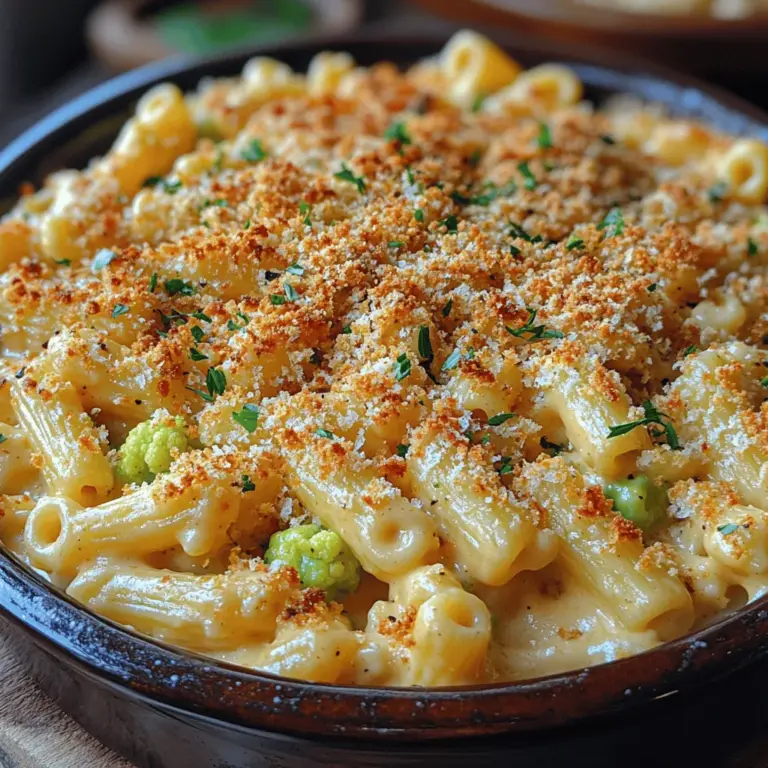Creamy Cauliflower Mac & Cheese Recipe
In recent years, the culinary landscape has seen a significant shift towards healthier comfort food alternatives, as more people seek to enjoy the flavors they love without compromising their dietary goals. Among these alternatives, Creamy Cauliflower Mac & Cheese has emerged as a standout dish, offering the beloved taste of traditional macaroni and cheese while packing a nutritious punch. This recipe not only satisfies cravings but also embraces the health benefits of cauliflower—making it an ideal choice for anyone looking to indulge without the guilt.
The Nutritional Appeal of Cauliflower
Cauliflower has become a staple in the health-conscious kitchen, revered for its versatility and low-carb content. This cruciferous vegetable is rich in vitamins C, K, and B6, and it provides a wealth of dietary fiber. One of its most appealing qualities is its ability to absorb flavors, making it an excellent substitute for pasta in recipes like mac and cheese. By swapping out traditional macaroni with cauliflower, you can significantly reduce the carbohydrate count while still enjoying a creamy, satisfying dish.
Why Choose Creamy Cauliflower Mac & Cheese?
Creamy Cauliflower Mac & Cheese is a delightful twist on the classic comfort food, combining the rich, cheesy flavor we all crave with the health benefits of a vegetable. The creamy texture is achieved through a careful blend of cheeses and a smooth sauce, ensuring that every bite is as indulgent as it is nutritious. Whether you’re following a low-carb lifestyle, looking to increase your vegetable intake, or simply seeking a new favorite recipe, this dish promises to deliver on all fronts.
Understanding the Ingredients
To create a truly exceptional Creamy Cauliflower Mac & Cheese, it’s essential to understand the key ingredients that contribute to its rich flavor and texture. Each component plays a vital role in the overall experience of this dish.
Cauliflower as the Star Ingredient
The foundation of this recipe is, of course, cauliflower. As a low-calorie vegetable, it serves as an excellent base that absorbs the flavors of the cheese and spices wonderfully. The health benefits of cauliflower extend beyond its low carbohydrate content; it is also high in antioxidants and can support heart health and digestion. When prepared correctly, cauliflower not only mimics the texture of pasta but also enhances the dish with a subtle nutty flavor.
Cheese Selections for Creaminess
The combination of cheeses is crucial for achieving that signature creamy texture that mac and cheese lovers adore. In this recipe, we will utilize sharp cheddar cheese for its robust flavor, mozzarella for its gooey stretchiness, and cream cheese for an extra layer of richness. Each cheese brings its unique character to the dish, ensuring that every bite is indulgent and satisfying.
Enhancing Flavors with Spices
To elevate the flavor profile of the dish, we will incorporate a blend of spices that complement the cheese and cauliflower beautifully. Garlic powder and onion powder add depth, while mustard powder introduces a subtle tanginess that brightens the overall taste. Smoked paprika lends a hint of smokiness, creating a complex flavor that enhances the dish’s comfort food appeal.
The Role of Breadcrumbs and Parmesan
For those who appreciate a little crunch, breadcrumbs and grated Parmesan cheese are essential for finishing touches. The breadcrumbs provide a delightful crispy topping that contrasts beautifully with the creamy base, while the Parmesan adds a salty, umami kick that rounds out the flavors. This combination not only enhances the presentation of the dish but also adds an enticing texture that elevates the eating experience.
Step-by-Step Preparation
Now that we’ve established the importance of the ingredients, let’s dive into the preparation process for this Creamy Cauliflower Mac & Cheese. The key to success lies in carefully executing each step, ensuring that the flavors meld together beautifully while maintaining the ideal texture.
Preparing the Cauliflower
The first step is to prepare the cauliflower. Begin by washing and cutting the cauliflower into bite-sized florets. This size will ensure even cooking and make it easier to incorporate into the dish. Blanching the cauliflower is a crucial step that dramatically affects both texture and taste. To blanch, simply bring a pot of salted water to a boil, then add the cauliflower florets. Cook them for about 3-4 minutes, just until they are tender but still crisp. This process helps to remove any bitterness and enhances the vegetable’s natural sweetness, ensuring a more enjoyable eating experience.
After blanching, promptly transfer the cauliflower to an ice bath to stop the cooking process. This technique will help preserve the bright color and crisp texture of the cauliflower, ensuring it remains a delightful contrast to the creamy cheese sauce.
Cooking the Pasta
While the cauliflower is cooling, it’s time to cook the pasta that will accompany the cauliflower. For this recipe, choose a small pasta shape such as elbow macaroni or shells, which will complement the cauliflower well. To achieve the perfect al dente pasta, bring a large pot of salted water to a boil and add the pasta. Follow the package instructions for cooking time, but start checking for doneness a minute or two early. You want the pasta to have a slight bite to it, as it will continue to cook once mixed with the hot cheese sauce.
Once the pasta is cooked to perfection, drain it and set it aside. Be sure to toss the pasta with a little olive oil to prevent it from sticking together while you finish preparing the cheese sauce.
Making the Cheese Sauce
The heart of any mac and cheese recipe is undoubtedly the cheese sauce, and in this version, we will create a homemade roux as the base. To start, melt butter in a saucepan over medium heat. Once the butter is fully melted and bubbling, whisk in an equal amount of all-purpose flour. This mixture, known as a roux, will serve as the thickening agent for your cheese sauce. Continuously whisk the roux for about 2-3 minutes or until it turns a light golden color. This cooking step is essential, as it removes the raw flour taste and develops a deep, rich flavor.
Next, gradually add your choice of milk or a combination of milk and cream to the roux, whisking constantly to prevent lumps from forming. The mixture will begin to thicken as it heats. Once you achieve a smooth consistency, it’s time to add the cheeses. Stir in the sharp cheddar, mozzarella, and cream cheese, allowing them to melt completely into the sauce. The result should be a velvety cheese sauce that envelops the pasta and cauliflower in a creamy embrace.
As you combine the ingredients, be sure to whisk continuously, as this is key to achieving a smooth sauce without lumps. Once the cheese is fully melted and incorporated, season the sauce with your selected spices—garlic powder, onion powder, mustard powder, and smoked paprika—to enhance the flavor profile.
With the preparation steps in place, you’re well on your way to creating a deliciously creamy and nutritious Cauliflower Mac & Cheese that the entire family will love. As you gather the ingredients and begin cooking, you’ll find that this dish not only offers a healthier alternative to traditional mac and cheese but also brings comfort and satisfaction to your dining table. Stay tuned as we continue with the assembly and baking steps, ensuring every element comes together for a delightful meal.
{{image_2}}
Combining Ingredients
Once your cauliflower puree is ready and the cheese sauce is prepared, it’s time to bring everything together for the ultimate creamy texture. Start by carefully pouring the cauliflower puree into the cheese sauce. Use a spatula to gently mix them together, ensuring that the puree is evenly distributed. This step is crucial, as it ensures that the cauliflower doesn’t settle at the bottom of the dish but instead integrates seamlessly into the cheese sauce.
Techniques for Blending
To achieve a smooth and creamy consistency, it’s important to use a whisk or a handheld mixer. Begin by whisking the cheese sauce vigorously, and then slowly incorporate the cauliflower puree. This method prevents lumps and creates a velvety texture that mimics traditional mac and cheese. If you find the mixture too thick, you can add a splash of unsweetened almond milk or vegetable broth to thin it out slightly. The goal is to create a sauce that coats the pasta beautifully without being too runny.
Ensuring Even Distribution of Flavors
After blending, taste the sauce to check for seasoning. Depending on your preference, you might want to add a bit more salt, pepper, or even a pinch of garlic powder for added depth. Make sure to mix well after adjusting the flavors. This will ensure that every bite of your creamy cauliflower mac and cheese is bursting with flavor.
Final Assembly
Now that your cheese sauce and cauliflower puree are perfectly combined, it’s time to fold in the cooked pasta. Choose your favorite pasta shape—elbow macaroni is classic, but shells or fusilli work wonderfully too.
Step-by-Step Guide on Folding the Pasta into the Sauce
1. Add the Pasta: In a large mixing bowl, combine the cooked pasta with the cheese and cauliflower sauce. Use a large spoon or spatula to gently fold the pasta into the sauce, ensuring every piece is coated. Be careful not to break the pasta; a gentle folding motion will help maintain its shape.
2. Transfer to Baking Dish: Once all the pasta is coated, transfer the mixture to a greased baking dish. Spread it out evenly, making sure there are no dry spots.
3. Topping: For a bit of crunch, sprinkle breadcrumbs over the top of the mac and cheese. You can also add extra cheese if you prefer a cheesier topping. A mix of panko breadcrumbs with a drizzle of olive oil creates a golden, crispy layer that contrasts beautifully with the creamy pasta beneath.
Baking the Mac & Cheese
Baking is an essential step in this recipe, as it enhances the flavors and provides that satisfying golden crust that everyone loves.
Importance of Baking for Texture and Flavor Development
When you bake the mac and cheese, the heat allows the flavors to meld together and intensifies the cheesy goodness. The baking process also helps to thicken the sauce slightly, making it even creamier. The result is a dish that has a delightful contrast between the creamy interior and the crispy exterior.
Ideal Oven Temperature and Baking Time
Preheat your oven to 350°F (175°C). Bake the mac and cheese for about 20-25 minutes, or until the top is golden brown and crispy. If you like an extra crispy crust, you can broil it for the last 2-3 minutes, but watch closely to prevent burning.
Tips for Checking Doneness
To check if your mac and cheese is done, insert a knife into the center; if it comes out hot and clean, the dish is ready. You can also give it a gentle shake; if the center is set and does not jiggle, it’s perfect for serving.
Serving Suggestions
Your creamy cauliflower mac and cheese is now ready to be enjoyed! There are many ways to elevate this dish even further.
Ideas for Garnishing
Consider garnishing your baked mac and cheese with fresh herbs like parsley or chives for a pop of color and freshness. A sprinkle of paprika or cayenne pepper can add a little heat, while a drizzle of high-quality olive oil enhances the flavor profile. For an extra touch, you can add some grated Parmesan cheese on top right before serving.
Pairing Suggestions
This dish pairs wonderfully with a variety of side dishes. A simple green salad with a light vinaigrette can balance the richness of the mac and cheese. Roasted vegetables or steamed broccoli make excellent accompaniments, adding nutrients and color to your plate. For a more substantial meal, consider serving it alongside grilled chicken or fish.
Nutritional Benefits of Creamy Cauliflower Mac & Cheese
One of the best aspects of this creamy cauliflower mac and cheese is its health benefits compared to traditional recipes.
Comparison of Traditional Mac and Cheese Versus This Healthier Alternative
Traditional mac and cheese is often loaded with calories, fat, and refined carbohydrates. By substituting cauliflower for a portion of the cheese and using whole grain pasta, you significantly reduce the calorie count while increasing the fiber content. This makes it not only more nutritious but also more filling, helping you stay satisfied longer.
Breakdown of Calories, Macronutrients, and Vitamins
A typical serving of creamy cauliflower mac and cheese contains approximately 350-400 calories, depending on the specific ingredients used. It also provides a balanced mix of macronutrients—about 15 grams of protein, 10 grams of fat, and 50 grams of carbohydrates per serving. Additionally, cauliflower is rich in vitamins C and K, folate, and antioxidants, contributing to your daily nutritional needs.
Discussion on Dietary Preferences
For those with dietary restrictions, this recipe is easily customizable. If you’re gluten-free, substitute the pasta with gluten-free varieties made from rice or quinoa. For a vegan option, use plant-based cheese alternatives and a non-dairy milk to create a creamy sauce without the use of dairy.
Conclusion
In conclusion, creamy cauliflower mac and cheese is a delicious and nutritious twist on a classic comfort food that everyone will love. With its rich flavors and creamy texture, this dish is perfect for family gatherings, casual weeknight dinners, or even meal prep for the week ahead. It provides all the comforting qualities of traditional mac and cheese while offering a healthier profile that you can feel good about serving.
We encourage you to try this recipe, whether for a cozy night in or as a crowd-pleasing dish at your next gathering. Its versatility allows it to fit seamlessly into any meal plan, making it a staple in modern cooking. Whether you’re a health-conscious eater or simply looking for a new take on a beloved dish, creamy cauliflower mac and cheese is sure to become a favorite in your household.



